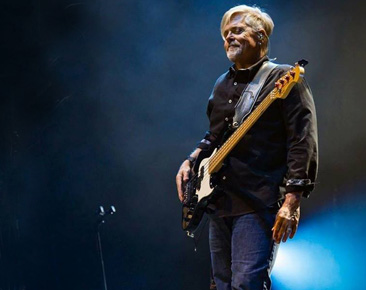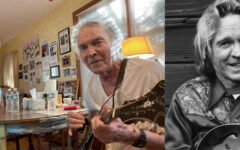
 It is serendipity when one’s name matches one’s being and the natural reaction of all those in his presence. When John Cowan sings any note the reflexive response of all within earshot is “Holy Cow.” Wow. Can anyone’s voice be that good? Yes, Cowan’s can. And, we are blessed that he shares it with us.
It is serendipity when one’s name matches one’s being and the natural reaction of all those in his presence. When John Cowan sings any note the reflexive response of all within earshot is “Holy Cow.” Wow. Can anyone’s voice be that good? Yes, Cowan’s can. And, we are blessed that he shares it with us.
It is nothing short of heavenly. Mic in hand, head tilted back, eyes a-twinkling, he belts out the songs, filling our ears and hearts with joy. The world is as it should be when John Cowan sings to us. Bliss saturates our blood. We melt from inside out; song after song, his voice soothes us like our second hot buttered rum. We embrace the massive group hug he provides and wish his words would wash over us forever.
John Cowan. Johnny C. JC. The Cow. There is no other. Just a humble guy who calls Louisville his hometown, singing it true and winning us over with his wondrous voice. From the New Grass Revival to The Doobie Brothers to The John Cowan Band to the new Darin and Brooke Aldridge combination to myriad other collaborations, John Cowan has been taking it to the streets since the age of 14 and having us listen to the music, that sweet music of his soulful, captivating voice, and the world is a better place for it. Take a few minutes to pull up his vocal vitality and dexterity on Callin’ Baton Rouge, his innate and stark beauty on Angel Eyes and his simple purity on Someone Give Me A Stone. Close your eyes and take in John’s tear-jerking rendition of Dark as a Dungeon. Perfection. Oh, tonight, and every night John sings to us, he has won our love. Hold to a dream that our afterlives have John Cowan on constant streaming.
Mr. Cowan was kind enough to sit down with us during the Telluride Bluegrass Festival this year. As Telluride fever rises again with the 2017 ticket lottery afoot, we wanted to share our chat with Johnny C in the famed box canyon. He was there as a performer, but also a guest, taking in the shows and enjoying the event. We are grateful for his time to reflect a bit on the Festival and talk to us about his work. It was a joy and an honor to catch up with him on his latest and walk a piece with him down memory lane.
JH: Tell me about your first bass love. Why did that become your instrument? Who did you hear playing it?
JC: It was mostly about Paul McCartney for me because the Beatles hit at a perfect age for me. I grew up in a church singing and I loved music, but I was also really into sports. I wanted to be a football player actually. I played football until my sophomore year of high school, but that is also when I got really serious about being a musician. We had a little neighborhood band and all the other instruments were taken. My bandmates were like, you play the bass. I was like, okay. It went kind of like that.
JH: Well, that worked out well for the rest of the world! Do you still have your first bass guitar?
JC: I do not, unfortunately. My first bass was made in Japan. It was called a Univox, and it was a copy of the Paul McCartney bass. Victor Wooten’s first bass was the exact same bass. I think he still has his.
JH: Other than Paul McCartney, were there other bass players that influenced you over the years?
JC: Absolutely. In rock music, it was Paul, Jack Bruce from Cream, and Chris Squire from Yes. My tastes changed but, of course, I always identified with guys that sang and played the bass.
JH: That is a hard thing to do.
JC: It is definitely a job. It is a lot to do. Peter Cetera from Chicago is also someone I loved along with Geddy Lee from Rush. There are not that many really good singing bass players because it is a bit of a job.
JH: When did you know you had a gifted voice?
JC: I think in my first band. We did this song by Spanky and Our Gang called Sunday Will Never Be The Same. I don’t know how we did it because it is a pretty sophisticated song. At the end, Spanky McFarlane, who was the lead singer of that band, does this outro with really high, long notes. I was singing that in full voice and the guys I was playing with were like, “Damn, you’re pretty good.” And, I was like, “Yea, I guess I am.”
JH: Who were some of your influences for vocals?
JC: When I was sponge-age as a musician, which was in my teens, we’re talking 1965-1968, AM radio was just crowded. It was a renaissance of pop music. I would turn on my radio and hear Stevie Wonder, Aretha Franklin, Smokey Robinson. I’m hearing Buck Owens, Ray Charles, Charlie Rich, The Beatles and The Rolling Stones. I’m hearing The Young Rascals with Felix Cavaliere and Eddie Brigati. Phenomenal singers. It was such an amazing time in pop music. As you go a little deeper, a little later, of course, then we had Zeppelin and Hendrix and on and on. I think it will be considered the golden age of popular music in the same way when the Gershwins were writing pop music in the 1930s and 1940s.
It was such a ripe time to be a young musician who was trying to take everything in. And, when you’re that age, you copy. The bar was set pretty high for copying these people. I was trying to copy Paul McCartney and Stevie Wonder and these Motown artists. It was a great time.
JH: So, right before New Grass Revival, what were you doing?
 JC: I was living in Louisville where I grew up. I was playing in a band and working in a car wash to make ends meet. The New Grass Revival bass player just quit. This is the Fall of 1974. Sam Bush and I had a mutual friend from Bowling Green, Kentucky, and Sam told this guy that NGR lost its bass player and they needed to get a real bass player. The guy they had right before me was actually a banjo player who was filling in on electric bass. So, Sam was like, we need a guy who really plays the electric bass. Our mutual friend, Ken Smith, said he knew a guy from Louisville who plays the bass really well and sings even better: his name is John Cowan and you should call him. And, so, I got a call from Sam Bush.
JC: I was living in Louisville where I grew up. I was playing in a band and working in a car wash to make ends meet. The New Grass Revival bass player just quit. This is the Fall of 1974. Sam Bush and I had a mutual friend from Bowling Green, Kentucky, and Sam told this guy that NGR lost its bass player and they needed to get a real bass player. The guy they had right before me was actually a banjo player who was filling in on electric bass. So, Sam was like, we need a guy who really plays the electric bass. Our mutual friend, Ken Smith, said he knew a guy from Louisville who plays the bass really well and sings even better: his name is John Cowan and you should call him. And, so, I got a call from Sam Bush.
JH: Were you listening to New Grass at that time?
JC: I wasn’t listening to them, but a woman I was dating who later became my first wife took me to see them. I was like, “I don’t want to go see a bluegrass band,” but she insisted that I would like it. I went to see the Revival, and it was Courtney Johnson on banjo, Curtis Burch on guitar and dobro, Sam Bush on mandolin, fiddle and vocals, Butch Robbins was playing the electric bass and they had a drummer. They all looked like me! They were all hippies, and they were playing this completely rocked out version of bluegrass. I was like, “Shoot. This is great!” So, when I got a call to come audition for them, I was like: “Okay!” I auditioned, and they hired me on the spot.
JH: Well, people like me love the story Sam Bush tells about your saying, “Oh, by the way, I can sing too.” Is that how that really happened?
JC: I was smart enough even at that age not to push it. I had never played bluegrass music before and the day they hired me, they fired the drummer. They were like, “You play good enough, we don’t need a drummer.” But, I never played without drums for one, and I didn’t know anything about bluegrass music. I simply said: just tell me what to do. So, we practiced about eight hours a day for a long time. They gave me a couple of records, a John Hartford record and a bunch of others, and they told me to go to school. Between listening to Norman Blake, John Hartford, Doc Watson and the Dillards and practicing eight hours a day, I never got around to singing.
Every once in a while I would say, “you know, I can sing a little bit too,” and, they were like, “that’s okay; let’s keep practicing.” Finally, they let me sing harmony on something. Then, about four months later, we were rehearsing, and Sam was an Allman Brothers fan and I was too and we both had a Greg Allman album that had a Jackson Browne song called These Days. We were sitting around practicing, and I asked if I could try singing that song. They were game. So, I sang These Days, and they looked at each other like, “damn, this guy is pretty good.” That is when Sam said, “I guess I am not the lead singer anymore.” That is a bit of an exaggeration though because we always shared vocal duties. I did not replace him. He is an awesome singer!
JH: When you reflect back on your time with New Grass Revival, how do you sum it up?
JC: It is one of the greatest gifts God ever gave me in my life. It was one of them besides my voice and the people that I have loved and continue to love. We have not played a note together since 1989, 27 years ago, and to this day people still know me from New Grass Revival. It has been a real blessing in my life. It is the gift that continues to give to me. It is not like we had any hits or anything, but especially in this world of Telluride and Merlefest and acoustic music, we are really well thought of and I am very proud of it. I still meet young musicians in this genre and they are like, “Man, New Grass Revival. I love you.” That is satisfying on a deep level. Knowing you did something – a piece of work and a piece of your life – that still resonates and has meaning for people is so gratifying.







